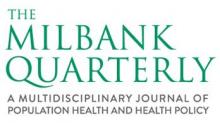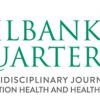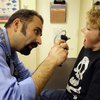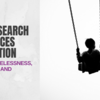0
Interactive
Community:
May 2, 2023
Sesame Workshop and Quest Diagnostics as part of the Quest for Health Equity (Q4HE) initiative
are working together to create a bilingual (English and Spanish), multimedia program that helps all
families build healthy habits as a foundation for lifelong well-being. This effort addresses systemic
barriers to health care and helps improve access to the critical resources every family needs to stay
well. The latest materials showcase how there are many ways to support families in being healthy
in both mind and body. The new resources include two videos and a digital storybook.
Below you’ll find sample social media copy to share these resources with your community. We
thank you for your commitment and support as we continue in our mission to help all children grow
smarter, stronger, and kinder.
Authored by: Sesame Street in Communities and Quest Diagnostics
Topics: Child welfare, dual-generation initiative, Early childhood, Family engagement, Health
 Shared by Sandra Ware
Shared by Sandra Ware
Sandra Ware posted a
on May 2, 2023
Sesame Street in Communities and Quest Diagnostics
Sesame Workshop and Quest Diagnostics as part of the Quest for Health Equity (Q4HE) initiative
are working together to create a bilingual (English and Spanish), multimedia program that helps all
families build healthy habits as a foundation for lifelong well-being.
0
Research
Community:
Jan 27, 2023

Poor maternal and child health (MCH) outcomes and rates of chronic disease are persistently high in the United States and concentrated in rural and service-deprived areas where local health departments provide most care. In a new Milbank Quarterly study, Taryn A. G. Quinlan, Amelia L. Mitchell, and Glen P. Mays of the Colorado School of Public Health use national survey data from 630 local health departments to understand the relationship between social service collaboration and the provision of direct MCH services, such as the Special Supplemental Nutrition Program for Women, Infants, and Children (WIC).
The authors found local health departments that directly offer MCH services were more likely to collaborate with community partners that provide social services. Still, more than half of these departments were considered low collaborators.
“By working together to address MCH disparities, health and social service organizations could pool resources to provide needed services and identify innovative solutions to address disparities in their communities, thereby increasing system capacity to achieve equitable health outcomes,” the authors say.
Authored by: Taryn A.G. Quinlan, Amelia L. Mitchell, Glen P. Mays for The Milbank Quarterly
Topics: dual-generation initiative, Early childhood, Health, Low-income, Partnerships, Research
 Shared by Sandra Ware
Shared by Sandra Ware
Sandra Ware posted a
on Feb 7, 2023
Taryn A.G. Quinlan, Amelia L. Mitchell, Glen P. Mays for The Milbank Quarterly
Poor maternal and child health (MCH) outcomes and rates of chronic disease are persistently high in the United States and concentrated in rural and service-deprived areas where local health departments provide most care. In a new Milbank Quarterly study, Taryn A. G. Quinlan, Amelia L.
0
Interactive
Community:
Self-paced courses for home visitors and supervisors and webinars that cover: the basics of home visiting, foundations of infant mental health in home visiting, domestic violence in home visiting, substance abuse in home visiting, the impact of trauma on home visiting, building engaging and collaborative relationships with families, and home visiting with families during pregnancy.
Authored by: The Ounce
Topics: Child welfare, Early childhood, Health, Home visiting
 Shared by Housing Is
Shared by Housing Is
Housing Is posted a
on Apr 29, 2019
Self-paced courses for home visitors and supervisors and webinars that cover: the basics of home visiting, foundations of infant mental health in home visiting, domestic violence in home visiting, substance abuse in home visiting, the impact of trauma on home visiting, building engaging and collabor
0
Research
Community:
Mar 8, 2019
The number of kids enrolled in Medicaid and the Children’s Health Insurance Program (CHIP) — two government health plans for the poor — fell by nearly 600,000 in the first 11 months of 2018, a precipitous drop that has puzzled and alarmed many health policy analysts, while several states say it reflects the good news of an improving economy.
Authored by: Michael Ollove for The Pew Charitable Trusts
Topics: Affordable Care Act, Child welfare, Early childhood, Health, Legislation & Policy, Low-income, Medicaid / Medicare, Research, Youth
 Shared by Housing Is
Shared by Housing Is
Housing Is posted a
on Mar 8, 2019
Michael Ollove for The Pew Charitable Trusts
The number of kids enrolled in Medicaid and the Children’s Health Insurance Program (CHIP) — two government health plans for the poor — fell by nearly 600,000 in the first 11 months of 2018, a precipitous drop that has puzzled and alarmed many health policy analysts, while several states say it refl
0
Research
Community:
Aug 28, 2018
Current efforts to end homelessness are largely focused on the immediate housing needs of adults. Yet recent research further demonstrates the importance of addressing childhood, early care, and education in efforts to prevent and end homelessness. This blog post summarizes five new studies. Topics include homelessness in the womb and during infancy; the Adverse Childhood Experiences of homeless adults; the employment of families during and after stays in homeless shelters; and the impact of Rapid Rehousing on the education of children and youth experiencing homelessness.
Authored by: SchoolHouse Connection
Topics: Child welfare, Dual-generation, Early childhood, Education, Health, Homelessness, Housing, Low-income, Pre-natal, Research
 Shared by Mica O'Brien
Shared by Mica O'Brien
Mica O'Brien posted a
on Oct 31, 2018
Current efforts to end homelessness are largely focused on the immediate housing needs of adults. Yet recent research further demonstrates the importance of addressing childhood, early care, and education in efforts to prevent and end homelessness. This blog post summarizes five new studies.
0
Interactive
Community:
Which neighborhoods in America offer children the best chance to rise out of poverty? The Opportunity Atlas answers this question using anonymous data following 20 million Americans from childhood to their mid-30s. Now you can trace the roots of today's affluence and poverty back to the neighborhoods where people grew up. See where and for whom opportunity has been missing, and develop local solutions to help more children rise out of poverty.
Authored by: Census Bureau, Harvard University, and Brown University
Topics: Asset building, Child welfare, Dual-generation, Early childhood, Education, Health, Housing, Low-income, Mobility, Stability, Youth
 Shared by Housing Is
Shared by Housing Is
Housing Is posted a
on Oct 12, 2018
Census Bureau, Harvard University, and Brown University
Which neighborhoods in America offer children the best chance to rise out of poverty? The Opportunity Atlas answers this question using anonymous data following 20 million Americans from childhood to their mid-30s.
0
Interactive
Community:
Sep 18, 2018
Understanding the characteristics of infants and toddlers in our states and communities is an important first step for supporting children’s development during their most critical years. Making more detailed and comprehensive information available on the young children living in different communities can help stakeholders more strategically develop and target key services such as child care, home visiting, or other services for young children. For example, knowing how many young children live in low-income families and what share have parents working full time can help states and localities tailor child care investments and services to reach those families who most need assistance.
Authored by: Cara Lou and Gina Adams for Urban Institute
Topics: Early childhood, East Coast, Health, Legislation & Policy, Midwest, South, West Coast
 Shared by Mica O'Brien
Shared by Mica O'Brien
Mica O'Brien posted a
on Sep 18, 2018
Cara Lou and Gina Adams for Urban Institute
Understanding the characteristics of infants and toddlers in our states and communities is an important first step for supporting children’s development during their most critical years.
0
Research
Community:
Aug 1, 2018
Homelessness among children is correlated with developmental delays, fair or poor health, and high healthcare utilization. Associations of homelessness specifically among infants younger than 12 months, however, are unknown. This study evaluates homelessness during infancy as a risk for adverse infant and maternal health and hardship.
Authored by:
Topics: Child welfare, Depression, Disabilities, Dual-generation, Early childhood, Education, Family engagement, Food insecurity, Grade-level proficiency, Health, Homelessness, Housing, Low-income, Metrics, Partnerships, Pre-natal, Research, School-readiness, Youth
 Shared by Housing Is
Shared by Housing Is
Housing Is posted a
on Aug 1, 2018
Homelessness among children is correlated with developmental delays, fair or poor health, and high healthcare utilization. Associations of homelessness specifically among infants younger than 12 months, however, are unknown.
0
Interactive
Community:
Jul 12, 2018
How does housing affect your family's well-being?
Authored by: How Housing Matters
Topics: Asset building, Asthma, Child welfare, Early childhood, Education, Health, Housing, Stability
 Shared by Housing Is
Shared by Housing Is
Housing Is posted a
on Jul 12, 2018
How does housing affect your family's well-being?


 Shared by Sandra Ware
on May 2, 2023
Shared by Sandra Ware
on May 2, 2023


 Shared by Sandra Ware
on Feb 7, 2023
Shared by Sandra Ware
on Feb 7, 2023

 Shared by Housing Is
on Apr 29, 2019
Shared by Housing Is
on Apr 29, 2019

 Shared by Housing Is
on Mar 8, 2019
Shared by Housing Is
on Mar 8, 2019



 Shared by Housing Is
on Oct 12, 2018
Shared by Housing Is
on Oct 12, 2018
 Shared by Housing Is
on Aug 1, 2018
Shared by Housing Is
on Aug 1, 2018
 Shared by Housing Is
on Jul 12, 2018
Shared by Housing Is
on Jul 12, 2018